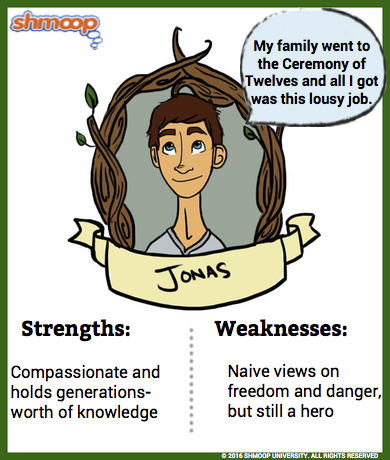Character Analysis

(Click the character infographic to download.)
Wide Receiver
Jonas, our main character and hero, is pretty dang impressive for a twelve-year-old guy. He's contemplative, careful, pensive, mature, compassionate, and composed. He can take care of an infant. He's selfless. He seems to have no qualms about volunteering to bathe super-old people. He treats The Giver with respect and bears pain without complaining.
Wow, huh?
That being said, he's still twelve, and we all know what that feels like. He wants to hang out with his friends, so it frustrates him (at least at first) that his job seems to leave no time for doing so. He gets the hots for Fiona which, again, is par for the twelve-year-old course. His little sister makes him roll his eyes, his friends get jealous when he's singled out—this all seems like normal stuff.
Wise Guy
This is really just more of the cool normal-but-weird set-up we see everywhere in The Giver. We recognize what's going on. It feels familiar. But it's infused with a dose of futuristic oddball stuff that makes us super uncomfortable. For example, Jonas is actually wiser than most of the adults in his life. He knows more than they do. In fact, he knows more than they ever will:
Now Jonas had a thought that he had never had before. This new thought was frightening. What if others – adults – had, upon becoming Twelves, received in their instructions the same terrifying sentence?
What if they had all been instructed: You may lie?
His mind reeled. Now, empowered to ask questions of utmost rudeness – and promised answers – he could, conceivably (though it was almost unimaginable), ask someone, some adult, his father perhaps: "Do you lie?" (9.45-47)
This is part of what makes him so unique: he's literally a twelve-year-old with the knowledge and wisdom of a very old man. Er, make that the knowledge and wisdom of most of humanity for generations and generations. That's quite the cross to bear.
So it's no surprise that Jonas flips out a little bit by the end of the novel, particularly when he realizes that his Father has been lying to him for as long as he's been able to speak English. His raging reaction is totally justified, and his decision to run away with Gabriel is heroic to say the least. Where Jonas really gets tested, as a person and as a hero, is at the end of The Giver.
It's easy to say, "I'm for freedom! I'm for individuality!" in words, but it's another thing to prove those beliefs with your actions. Jonas has to come to grips with the fact that, yes, freedom is dangerous:
"Oh." Jonas was silent for a minute. "Oh, I see what you mean. It wouldn't matter for a newchild's toy. But later it does matter, doesn't it? We don't dare to let people make choices of their own."
"Not safe?" The Giver suggested.
"Definitely not safe," Jonas said with certainty. "What if they were allowed to choose their own mate? And chose wrong?" (13.15-17)
But he also realizes that freedom's worth more than make up for its dangers. Yes, he may have made the wrong choice—but, dangit, he walks up that snowy hill anyway. It's a Rocky moment. It's a slaying-Voldemort moment. It's his version of the Hunger Games salute. What we mean to say is, Jonas gets clear hero status in our book, while at the same time being vulnerable enough to seem human. And that's exactly why we're rooting for him every step of the way.
Jonas Timeline